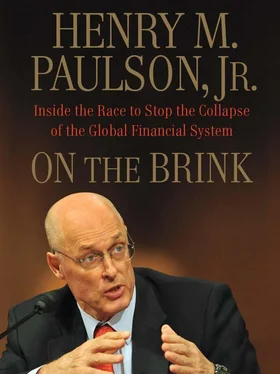At 2:25 p.m. I spoke with John McCain, who had just returned to Washington. The call did nothing to ease my mind.
“We have to protect the American taxpayers,” he told me, pointing out that nothing would get done in Congress without the House Republicans. They didn’t like our proposal and I needed to listen more carefully to them, he said.
“John, our system is on the edge,” I told him. “WaMu barely got bailed out today. Several other institutions are on the brink. If we don’t get something done soon, this economy is going to collapse.”
I was so concerned that McCain would do or say something rash that I resorted to a veiled threat: “I’m not a politician, but if you or anyone else does something that causes this system to collapse, it is not going to just be on me. I am going to go and say what I think to the American people.”
As soon as we finished up, I called Joel Kaplan at the White House to let him know that I’d had a tough conversation with the Republican presidential candidate. Not long after, Senator Judd Gregg called to confirm my worst fears about McCain’s return.
“Hank,” the New Hampshire Republican said, “I have just been in a meeting that took my breath away.”
McCain, it seems, had come to Washington to save the day, and became livid when he got off the plane to learn that a deal had apparently been reached without him. As Judd told me, McCain, with Lindsey Graham at his side, had come in late to the Senate Republican Policy Committee luncheon, held weekly in the Mike Mansfield Room on the second floor of the Capitol. McCain sat through part of a presentation by Bennett and a short one by Judd. Lindsey told the assembly of 40 or so senators, “It’s not right for any of you to reach an agreement, because there is no agreement unless John agrees.”
Then, Judd related, McCain had declared, “I don’t care what you people do, I am going to do what is right for the country.” The Arizona senator subsequently stormed out, leaving the Republican senators to finish their lunches, whether or not they had any appetite left.
Now I knew why McCain had seemed so angry when we’d spoken half an hour before.
I’d barely gotten off the phone when Barney Frank called to tell me that Spencer Bachus had just blown up the deal. Bachus had put out a statement saying he had not been authorized to cut any deals and that that morning there had been “no agreement other than to continue discussions.”
Bachus later insisted to me that he had been acting on orders from Boehner, who must have understood that any agreement that was not supported by a critical mass of House Republicans was doomed to failure.
Barney wanted me to speak with Nancy Pelosi; the three of us got on the phone, and the two Democrats reamed me about Bachus. They basically wanted to know how they could get anything done with, as they said, Republicans behaving that way.
Meantime, the Republican leaders of both houses, John Boehner and Mitch McConnell, had been putting out statements asserting that there had been no agreement on a deal with the Democrats.
None of this confusion and contentiousness boded well for the upcoming meeting at the White House.
Joel Kaplan asked me to meet with President Bush before the bipartisan gathering in the Cabinet Room. The three of us stood on the terrace outside the president’s private dining room, and I watched George Bush chew on an unlit cigar on that damp, chilly afternoon. I told him of my exchange with McCain, and I saw a trace of a smile on his lips. He said that it was good that I had been firm. We were playing for big stakes. He said he sure hoped McCain knew what he was doing. As always, he tried to reassure me.
“Hank, we are going to get this done,” he promised. “There has to be some way Boehner can work this, and maybe I can help with the House Republicans.”
Any hope that conversation gave me was quickly shot down when we walked into the Oval Office, where GOP leaders had gathered. Everyone was trying to be cooperative. McConnell said we had to try to make this happen. But Boehner said nothing had changed; he didn’t have the votes.
“We need to get there,” the president said, pressing him.
“I’m trying,” Boehner said, reflecting his caucus’s reluctance. “I don’t have the support.”
All along Boehner had said he couldn’t deliver the votes, and now it looked like he was falling down on the job. I think he blamed me for putting him in this position. He wouldn’t speak to me again until October 3, when Congress finally approved TARP.
From the Oval Office we walked down the short corridor to the Cabinet Room to join the Democratic leadership, Obama, and McCain. It was quite an august group that had been assembled to hash out a solution to the financial crisis. Arrayed around the oval mahogany table with the president, the vice president, McCain, Obama, and me were the members of the House and Senate leadership: Reid and McConnell, Pelosi and Boehner, Dodd and Shelby, Frank and Bachus, Durbin and Hoyer. Staffers filled the chairs lined up along the walls and in front of the French doors that opened out onto the Rose Garden.
The president started the meeting by saying that we had a common objective and that we needed to work together to act as quickly as possible to reach our goal. As he spoke, I felt a sharp foreboding as I surveyed this group of politicians who represented disparate interests and were in some cases uncompromising in their positions. The president asked me to speak, and I once again described the dire conditions in the market and the need for emergency powers. When I finished, the president said he had a simple test for making a decision on this: “If Hank Paulson and Ben Bernanke say it’s going to work and help stabilize the financial system, we are for it.”
By protocol, the president turned to call on the Speaker of the House. And when Pelosi spoke, it was clear the Democrats had done their homework and had planned a skillful response for McCain. Pelosi said that Obama would represent the Democrats, who, she pointed out, had been working with me in good faith to formulate a deal. Harry Reid agreed that Obama would speak for the Democrats.
Then Obama delivered a thoughtful, well-prepared presentation, sketching the broad outlines of the problem and stressing the need for immediate action. He said the Democrats had been working closely with me; he ran through the rough terms of the morning’s discussion on the Hill, then mentioned the need for adjustments on oversight and executive compensation, as well as help for home-owners. He spoke without notes—much less a teleprompter—and spoke eloquently. “The Democrats will deliver the votes,” he asserted.
Then he sprang the trap that the Democrats had set: “Yesterday, Senator McCain and I issued a joint statement, saying in one voice that this is no time to be playing politics. And on the way here, we were on the brink of a deal. Now, there are those who think we should start from scratch…. If we are indeed starting over, the consequences could well be severe.”
But, of course, there was no deal yet. Bachus had been maneuvered into giving credibility to the appearance of one. But he, Boehner, and McConnell had since issued statements disclaiming the idea that there ever had been a deal.
Now Obama and the Democrats were skillfully setting up the story line that McCain’s intervention had polarized the situation and that Republicans were walking away from an agreement. It was brilliant political theater that was about to degenerate into farce.
Skipping protocol, the president turned to McCain to offer him a chance to respond: “I think it’s fair that I give you the chance to speak next.”
But McCain demurred. “I’ll wait my turn,” he said. It was an incredible moment, in every sense. This was supposed to be McCain’s meeting—he’d called it, not the president, who had simply accommodated the Republican candidate’s wishes. Now it looked as if McCain had no plan at all—his idea had been to suspend his campaign and summon us all to this meeting. It was not a strategy, it was a political gambit, and the Democrats had matched it with one of their own.
Читать дальше












